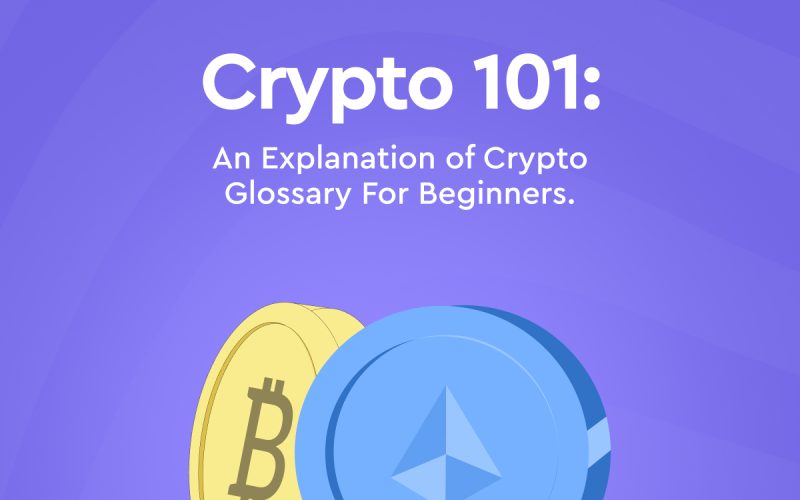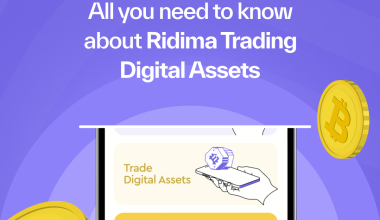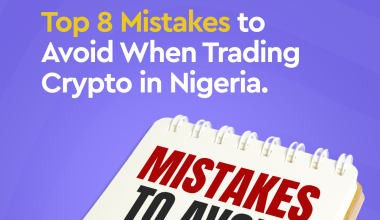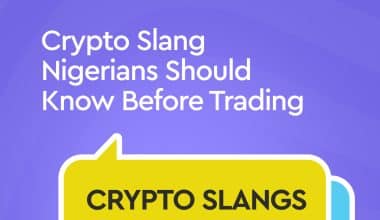If you are new to the world of digital assets, understanding crypto terms can feel like learning a new language. Today, you can hear “Buy the dip,” while another day someone is screaming “HODL.” The truth is that all this jargon can be confusing, especially when you are a newbie who is just trying to get a grip on the basics. That’s why this crypto glossary for beginners is here to help.
In this guide, we break down essential crypto terms in simple, clear language. Whether you are trading your first token, exploring Web3, or just curious about how it all works, this article will give you the foundation you need to speak crypto with confidence. Let’s go on this journey.
The Ultimate Crypto Glossary For Beginners.
Cryptocurrency is reshaping how people manage and grow their money, giving individuals more financial freedom and new ways to build wealth. But to truly benefit from it, you need to understand the basics. The first step is to start with the language. Below is a simple overview of some key crypto terms you should know;
- Cryptocurrency
Cryptocurrency is a type of digital money you can use to buy, sell, or trade online. Unlike regular money issued by banks or governments, it is powered by blockchain technology. As such, it is secure, transparent, and independent of any central authority.
- Blockchain
Blockchain is a digital system that records transactions in a secure, transparent, and unchangeable way. Think of it as an online ledger or database where every transaction is added in blocks and linked together like a chain. Hence, it is almost impossible to alter or hack the blockchain. It’s the foundation behind most cryptocurrencies.
- Wallet
A wallet is a digital tool that lets you store, send, and receive cryptocurrency. It doesn’t hold the coins physically, but it keeps the private keys that give you access to your crypto. Wallets can be online (software wallets) or offline (hardware wallets).
- Public Key and Private Key
- Public Key
A public key is like your crypto account number. It is a unique address that others can use to send you cryptocurrency. You can safely share it with anyone.
- Private Key
A private key is like your secret password. It gives you full control over your wallet and funds. Never share it with anyone. The reason is that if someone gets your private key, they can access and steal your crypto.
- Cryptocurrency Exchange
A cryptocurrency exchange is an online platform where you can buy, sell, or trade cryptocurrencies, such as Bitcoin, Ethereum, or Solana. Some exchanges, like Ridima, allow you to convert cryptocurrency to Naira, while others only permit trades between cryptocurrencies. Think of it as the marketplace for digital currencies.
- Altcoin
An altcoin is any cryptocurrency that is not Bitcoin. The term “altcoin” originates from “alternative coin,” referring to other cryptocurrencies that serve as alternatives to Bitcoin. Altcoins can serve various purposes, like providing privacy, enabling decentralized finance (DeFi), or facilitating specific use cases like gaming or file storage.
- Decentralized Finance (DeFi)
Decentralized Finance (DeFi) refers to financial services, such as lending, borrowing, saving, or trading, that operate on blockchain technology without the need for banks or intermediaries. With DeFi, anyone with internet access can utilize financial tools directly through smart contracts, thereby giving more people control over their finances.
- Smart Contracts
A smart contract is a self-executing agreement written in code and stored on a blockchain. It automatically carries out actions, such as sending or receiving money, when specific conditions are met. There’s no need for a middleman, as a smart contract runs exactly as programmed.
- FOMO and FUD
Fear of missing out (FOMO) is the anxious feeling that makes people rush to buy a cryptocurrency because they see others profiting from it. It often leads to impulsive decisions driven by hype rather than research.
Fear, uncertainty, and doubt (FUD) will include negative information that spreads fear in the market. It can cause people to panic-sell or avoid investing, even when the news isn’t fully reliable.
- HODL
HODL literally means “Hold On for Dear Life.” The popular slang term refers to holding onto your cryptocurrency instead of selling it, especially during market downturns. Originally a misspelling of “hold,” but now reflects a long-term mindset where investors keep their coins despite price swings. They assumed that the coins would gain value over time.
- Gas Fees
Gas fees are the small charges you pay to complete a transaction on a blockchain network, such as sending cryptocurrency or using a smart contract. These fees are paid to the network’s miners or validators, who process and secure transactions. The rule is that the busier the network, the higher the gas fees can be.
- Mining
Mining is the process of verifying and adding new transactions to a blockchain. It involves powerful computers solving complex math problems. In return, miners earn cryptocurrency as a reward. It’s how coins like Bitcoin are created and how the network stays secure and decentralized.
- Token or Coin
A token is a type of digital asset created on a blockchain. It can represent anything, such as a coin, ownership, access rights, or even rewards. On the other hand, coins like Bitcoin or Ethereum operate their blockchains, whereas tokens are typically built on existing networks such as Ethereum or Solana.
- Stablecoin
A stablecoin is a type of cryptocurrency designed to keep a stable value. It is usually tied to a real-world asset, such as the U.S. dollar or gold. This makes it less volatile than other cryptocurrencies, which is why people use stablecoins like USDT or USDC for saving, trading, or sending money without big price swings.
- Non-Fungible Token (NFT)
An NFT is a unique digital asset that represents ownership of a one-of-a-kind original, such as art, music, videos, collectibles, or in-game items. Unlike regular crypto coins, NFTs are not interchangeable because each one is one-of-a-kind. They are stored on the blockchain, which verifies ownership and ensures authenticity.
- Airdrop
An airdrop occurs when a cryptocurrency project distributes free tokens or coins to users. It comes as a reward, promotional incentive, or part of a launch. To receive an airdrop, users may need to hold a certain crypto, sign up, or complete a small task. It is a common way new projects spread awareness and grow their communities.
- Whale
A whale is someone who holds a large amount of cryptocurrency. Whales can be individuals, investment firms, or early adopters who got in when crypto was cheap. Due to their massive holdings, whales can influence market prices when they buy or sell, often causing big price swings.
- Rugpull
A rug pull is a type of scam in the crypto world where a developer or project team suddenly withdraws all funds from a project and disappears. Well, that is not taking profit because these people leave investors with worthless tokens. This occurrence is common with new or low-quality DeFi or NFT projects. As such, it is important to do research before investing.
- Decentralized Autonomous Organization (DAO)
A Decentralized Autonomous Organization (DAO) is an organization run by code instead of people. It operates on a blockchain, where rules and decisions are made through smart contracts and voted on by members using tokens. There’s no CEO or central authority everything is controlled by the community, making DAOs transparent, democratic, and decentralized.
- Liquidity Pool
A liquidity pool is a collection of cryptocurrency locked in a smart contract to make trading on decentralized exchanges (DEXs) easier. It allows users to swap tokens instantly without needing a buyer or seller on the other side. People who add their crypto to the pool earn rewards from trading fees.
Conclusion.
The crypto world can be intimidating at first, but understanding the language is the first step to building confidence. With this crypto glossary for beginners, you now have a simple guide to help you make sense of the terms you will see and hear in conversations, on platforms, or while trading. In life, knowledge is your strongest asset. Continue learning, stay curious, and don’t hesitate to ask questions. If you are ready to trade or convert your crypto safely, Ridima is here to help you do it securely and with ease.
Reference
https://www.getkoyn.com/blog/crypto-101-an-explanation-of-crypto-glossary-for-beginners
If you enjoyed this, read more here;
https://www.myridima.com/blogs/how-to-instantly-sell-solana-in-nigeria
https://www.myridima.com/blogs/crypto-airdrop-scams-5-red-flags-to-watch-out
https://www.myridima.com/blogs/top-5-ways-to-convert-bitcoin-to-naira
https://www.myridima.com/blogs/how-to-use-amex-gift-card-to-make-payments-on-amazon
https://www.myridima.com/blogs/how-much-is-1-dollar-bitcoin-in-naira-today
https://www.myridima.com/blogs/best-app-to-convert-bitcoin-to-naira
https://www.myridima.com/blogs/is-cryptocurrency-different-from-bitcoin
https://www.myridima.com/blogs/is-cryptocurrency-different-from-bitcoin
https://www.myridima.com/blogs/all-you-need-to-know-about-ridima-trading-digital-assets
https://www.myridima.com/blogs/crypto-to-naira-in-seconds-ridimas-groundbreaking-new-feature
https://www.myridima.com/blogs/american-express-gift-cards-everything-you-need-to-know-about-them
https://www.myridima.com/blogs/how-much-is-100-amex-giftcard-to-naira
https://www.myridima.com/blogs/how-much-is-500-amex-gift-card-to-naira
https://www.myridima.com/giftcard/calculator
https://www.myridima.com/blogs/top-10-gift-cards-with-high-rates-in-nigeria
https://blog.myridima.com/how-to-get-free-steam-cards-online-2024/
https://blog.myridima.com/ridima-just-added-solana-cash-out-your-sol/
https://www.myridima.com/blogs/apple-gift-cards
https://www.myridima.com/blogs/how-to-check-apple-gift-card-balance
https://www.myridima.com/blogs/how-much-is-an-apple-gift-card-in-nigeria-today
https://www.myridima.com/blogs/cardtonic-vs-ridima-best-app-to-sell-gift-cards
https://www.myridima.com/blogs/how-to-redeem-gift-card-in-nigeria-in-2024
https://www.myridima.com/blogs/how-to-determine-the-rate-of-gift-cards
https://www.myridima.com/blogs/how-to-sell-gift-cards-in-nigeria



